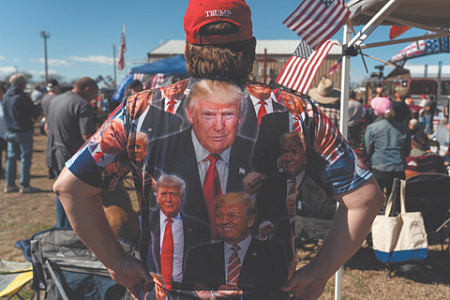
The first package of EU retaliatory measures to the introduction of additional duties by the United States on goods from European countries has been approved. In Brussels, they decided to hit Donald Trump’s voters. A significant part of the EU’s retaliatory duties will affect goods from the states where its support is particularly strong. The Europeans decided to contribute to the erosion of Trump’s electoral base. And the tariff increase, which was misunderstood even in the Republican factions of Congress, has already caused serious confusion, but not yet a split in the ranks of the Trumpists.
The EU countries voted on Wednesday, April 9, to impose retaliatory duties against the United States almost unanimously. Only Hungary was against it. As Hungarian Foreign Minister Peter Szijjarto explained in a video message, the EU is making a big mistake by responding to American duties without trying to negotiate with Trump.
He warned that a tariff war would only lead to higher prices, particularly in Europe, and eventually they would have to negotiate anyway, because that was “the only way out of the situation.” Although many European politicians and experts say the same thing, the EU still decided that Trump’s actions should not be left unanswered.
The European Commission’s statement does not list all the countermeasures – this will be done only after they are published in the Official Journal of the EU, which is equivalent to the entry into force of the decision. However, the journalists still managed to find out something. According to Bloomberg, the duties will amount to 25% and will affect US imports of 21 billion euros. It turns out that it was decided to give Trump an almost symmetrical answer, at least if we use numbers. At the same time, the EU’s blow can be considered even more painful for the US president. Retaliatory duties, in particular, are imposed on steel, iron, aluminum, meat, tobacco, soybeans, orange juice, Harley Davidson motorcycles and Levi Strauss jeans. The blow, therefore, will fall most heavily on Republican states. It was mostly done in them. There have been suggestions in the press that the duties will affect Trump’s favorite alcoholic beverage, bourbon. But, as far as is known, it is not on the list of accepted countermeasures. It seems that the pressure of the wine lobby has affected. Trump threatened to impose duties of 200% on European wines in response to duties on bourbon.
The European Commission has indicated that this is only the first package of measures. It will enter into force on April 15. The second package will be valid from May 15, the third from June 15, and so on, until December. By this time, as the EU hopes, Trump will come to his senses. Or they’ll make him come to his senses.
There are signs that a significant number of his supporters are gradually starting to turn away from the president. It’s not just about ordinary Trumpists, although, judging by polls, they are gradually becoming disillusioned with their idol. They expected that Trump would create jobs for them by returning production to America. Instead, so far there is only a depreciation of Americans’ savings due to the stock market panic provoked by the tariff war. There are murmurs in the Republican Party faction. Four Republicans supported in the Senate a resolution proposed by the Democrats calling for the abolition of duties for Canada. Now, Oregon Senator Ron Wyden has come up with a proposal to cancel Trump’s decision altogether for all 185 countries affected by it. This representative of the Democratic Party is going to present a draft resolution at a hearing of the Senate Finance Committee, which will be held in the near future. Wyden claims that a part of the Republican Party is going to support his project.
The tip of the iceberg of behind-the-scenes passions currently simmering in the ranks of the Trumpists is probably the public skirmish between two Trump advisers, billionaire Elon Musk and economist Peter Navarro. The latter is often referred to as one of those (perhaps even the main one) under whose influence the US president made his ill-fated decision on duties. Navarro accused Musk that he, the owner of Tesla, is too interested in supplying parts from abroad to genuinely support protectionist measures. Musk responded by calling him an “idiot” and “dumb as a cork.” The billionaire does not dare to attack the president, although it seems that the introduction of protectionist duties is primarily Trump’s idea. He has not talked so consistently about anything other than the need to correct the trade deficit through tariffs for decades. “This is a symbol of Trump’s faith,” Vladimir Vasiliev, chief researcher at the Institute of the USA and Canada of the Russian Academy of Sciences, said in a comment to NG.
The expert recalls that there was an increase in tariffs during the first term of the current US president. However, then it was at the stage of the rise of the American economy. Now that the United States is on the verge of recession, it is not necessary to expect that the tariff increase will have any positive effect.
“Trump is playing a game of chance, and it’s quite difficult to say where it will lead him. The consequences of his decision, of course, were poorly calculated. It’s one thing to wage a tariff war with a group of countries, but it’s another to wage a tariff war with almost the entire world. To date, the US government has already been alarmed by Trump’s actions: purges, threats and the fight against the deep state. And here is such a test. It is possible that this tariff war may determine the fate of the president,” Vasiliev believes.
